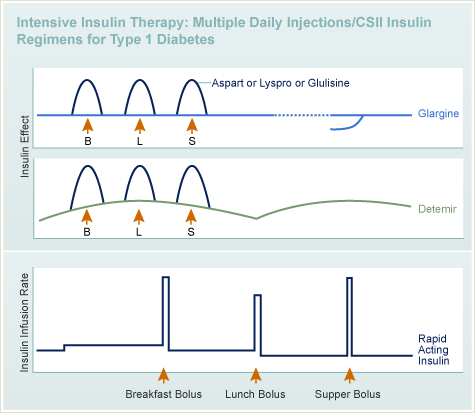For Intensive Regimens:
When you are intensively managed with insulin your medical provider will prescribe an insulin regimen for you, but these are the general principles:
Your medical provider should prescribe:
- A basal or background insulin dose
This will be prescribed as one or two injections of long acting insulin, or, if you are using an insulin pump, a daily infusion rate of continuous, small amounts of rapid acting insulin. The background/basal insulin dose is usually the same day to day. With an insulin pump you do have the option of temporarily changing the background rate for a few hours – up or down as needed! - A bolus insulin dose to cover the sugar or carbohydrate in your food
This will be presented as an insulin to carbohydrate ratio( I:CHO). The I:CHO ratio tells you how many grams of carbohydrate can be covered by one unit of rapid acting insulin. You will need to calculate how much carbohydrate you will eat, and take a dose of insulin that matches the food. - A bolus insulin dose to bring your blood sugar back to the normal range
A high blood sugar correction bolus insulin dose to bring your blood sugar back into the target range. This will be presented as a correction factor. This correction factor refers to how much your blood sugar will drop after 1 unit of insulin rapid acting insulin. When your blood sugar is too high, you will need to calculate how much your blood sugar is over the target, and, based on the correction factor, take the dose of insulin that will bring you down into the desired range.
Common intensive regimens:
- Long-acting insulin (glargine/detemir) once or twice a day with rapid acting insulin (Aspart, glulisine, lispro) before meals and as need to correct high blood sugars.
- Rapid acting insulin (Aspart, glulisine, lispro) delivered via an insulin pump.

For more information, please refer to the following sections:
Self-assessment Quiz
Self assessment quizzes are available for topics covered in this website. To find out how much you have learned about Treatment of Type 1 Diabetes, take our self assessment quiz when you have completed this section. The quiz is multiple choice. Please choose the single best answer to each question. At the end of the quiz, your score will display. If your score is over 70% correct, you are doing very well. If your score is less than 70%, you can return to this section and review the information.
